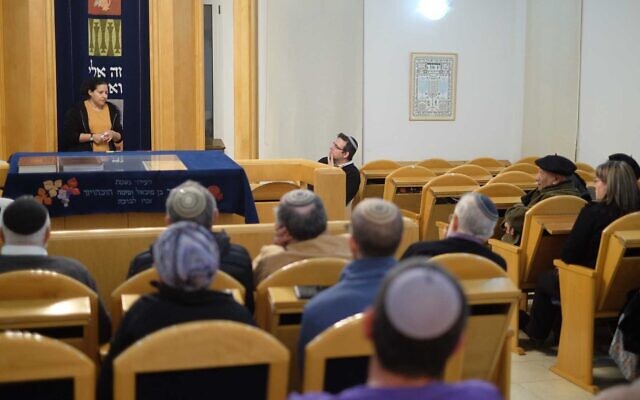
[ad_1]
At first, Rabbi Yoni Rosensweig was simply searching for some solutions to some questions he’d been requested about Jewish regulation and psychological well being. That shortly became a e book after which a middle, which he helps run and which has already educated dozens of rabbis.
“This topic kind of chose me. I fell into it and I realized that there was what to do. And before I knew it I saw that there was a significant response from the community. So I said to myself, if this is so important to people, maybe I should be doing this,” Rosensweig informed The Times of Israel on Sunday.
Though he’s primarily centered on this nexus of psychological well being and Jewish regulation, Rosensweig wears many hats. Ordained by the Orthodox Yeshivat Birkat Moshe within the Maale Adumim settlement, he leads the group of Netzach Menashe in Beit Shemesh, teaches on the progressive Orthodox Midreshet Lindenbaum in Jerusalem, has written a number of books, and maintains a big following from his work as a posek, a rabbi who makes sensible rulings on Jewish regulation, or halacha. His ask-me-anything classes forward of Passover, as an illustration, are to not be missed. (Full disclosure: He additionally officiated this reporter’s wedding ceremony in 2019.)
Rosensweig’s journey into the sphere of psychological well being started roughly 5 years in the past when he acquired some questions from his group. Looking to raised perceive the subject, Rosensweig spoke to Dr. Shmuel Harris, a psychiatrist and the pinnacle of Machon Dvir, a behavioral well being clinic in Jerusalem.
“My goal was to just answer a few questions. But as I got into it and realized that there’s a lot more work to do here, we decided to write a book on this topic,” Rosensweig stated.
The e book that the 2 wrote collectively, “Nafshi B’She’elati,” was launched in Hebrew by Koren Publishers in 2022. An English translation is simply anticipated to be revealed later this yr, however his work has already made waves in English-speaking communities in Israel and all over the world.
“There are many topics in halacha that I could have chosen to look into. But this one affects hundreds or thousands of people every single day. It’s actually unbelievable to me that a book like this hasn’t been written before. It’s something that’s so monumentally important to people, that directly deals with their quality of life and sometimes with their very lives,” he stated.
The 512-page “Nafshi B’She’elati” is geared towards rabbis and different professionals, with detailed explanations of technical terminology — each psychological and rabbinic — and footnotes which are usually longer than the principle textual content. But even for informal laypeople, it’s nonetheless an enchanting learn, addressing subjects like schizophrenia, melancholy, consuming problems, phobias, autism and dementia.
With the discharge of the e book, Rosensweig additionally based Ma’aglei Nefesh: The Center for Mental Health, Community, and Halacha, which helps join individuals with psychological well being points to therapists and rabbis, produces literature on psychological well being and halacha, and performs 50-hour coaching classes for rabbis on psychological well being subjects.
We know methods to discuss most cancers, not melancholy
Though he’s removed from the one rabbi to think about the connection between psychological well being and halacha, Rosensweig has emerged as a distinguished voice on the subject, talking about it no less than per week both inside spiritual communities — in synagogues or seminaries — or to medical or psychological well being professionals, in hospitals, or to teams of social staff.
Rosensweig held such an occasion on Sunday evening, talking about his work within the Neve Habaron Synagogue within the northern city of Zichron Yaakov, the place he was joined onstage by a spiritual lady who shared her experiences coping with nervousness, melancholy, and suicidal ideas.
The discuss dealt each with the necessity for communities to broaden their fascinated about psychological well being and with what concerns go into his rulings on halacha.
Rosensweig stated his hope is that via occasions like this, communities will be taught the vocabulary needed for open discussions about psychological well being, as they have already got for bodily well being.

Or discusses her struggles with psychological well being on the Neve Habaron synagogue within the northern city of Zichron Yaakov on January 22, 2023. (Judah Ari Gross/Times of Israel)
“Even if you don’t have professional, medical training, you can make small talk about physical health. If you find out a person — heaven forbid — has cancer, someone will say, ‘Have you seen an oncologist? Have you started chemotherapy?’ I don’t know what chemotherapy is, not really, but I can still talk about it and sound sensitive and informed so that the person feels that they can talk to me about it. If I run into them on the street, I can ask how they are doing, how they feel,” Rosensweig stated.
“But when it’s depression, we don’t know what to say. That’s the problem. I know that five years ago, I didn’t know how to have that kind of small talk about mental health. If you find out someone has depression, you often don’t know what comes next. Do you see a psychologist? A psychiatrist? A social worker? How long does it last? What’s the process? And if you see that person, what do you ask, ‘How’s your depression?’ What’s the right and sensitive thing to say?” he stated.
Halacha and psychological well being
For spiritual Jews, halacha governs most facets of their lives, akin to how and what they eat, how they work together with household, and the way they spend Shabbat. Those spiritual legal guidelines will be difficult and even harmful in some circumstances for individuals with sure psychological well being points. Fasting on Yom Kippur can set off a doubtlessly grave relapse for an individual who has handled an consuming dysfunction, as an illustration.

A replica of Nafshi B’She’elati by Rabbi Yoni Rosensweig and Dr. Shmuel Harris. (Judah Ari Gross/Times of Israel)
“Nafshi B’She’elati” and far of Rosensweig’s work focuses on delving deep into the supply materials to search out which facets of halacha are versatile, the place exceptions will be made, and that are unequivocal divine prohibitions that may’t be outdated. Some of that is primarily based on the character of the commandment — does it come instantly from the Bible or was it developed later by rabbis — and a few is predicated on the impact that it could have on the particular person — is it life-saving or merely palliative?
However, whereas a lot of “Nafshi B’She’elati” offers with issuing halachic leniencies for individuals with varied psychological well being situations, Rosensweig careworn that rabbis shouldn’t be blindly permissive both so as to be sure that the particular person feels that they’re nonetheless abiding by Jewish regulation and are nonetheless a part of a spiritual group.
He famous that nobody is pressured to observe Jewish regulation. The individuals coming to him usually are not trying to get out of spiritual obligations; they need to observe them.
“People want to fast on Yom Kippur. If you tell them they can’t, they feel rejected from the group, from the community. They want to be part of this holy and awesome day. When someone’s told they can’t fast, it’s not good news for them — it’s difficult news,” Rosensweig informed the three dozen or so individuals who gathered within the Zichron Yaakov synagogue.
Rosensweig provided an instance, a comparatively widespread one, of an individual with melancholy or nervousness who’s helped by listening to music. What can an individual like that do on Shabbat, when using electrical energy is restricted?
In idea, Rosensweig stated, a rabbi might merely allow such an individual to make use of their telephone or laptop to hearken to music on Shabbat. However, doing so wouldn’t essentially make the particular person really feel that they’re maintaining the legal guidelines of Shabbat.
“We’re trying to fight stigma. We want people dealing with mental health issues to feel seen and understood, not to feel that they are separate from the group, that they are rejected, that they are second-class. Every exception made for a person for mental health reasons feels to them like a failure, like they are not really keeping Shabbat, that they are not strong like everyone else,” he stated.
Instead, he recommends having the particular person placed on a playlist on a loop earlier than Shabbat in order that if they should hearken to music, they want solely put of their headphones with out truly turning something on.
“You need to strike a balance in how you rule on halacha,” he stated.
[adinserter block=”4″]
[ad_2]
Source link